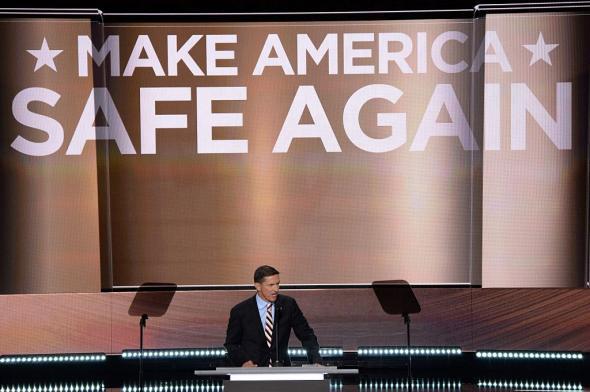This post has been updated with developing news.
Former Trump administration national security adviser Michael Flynn pleaded guilty in federal district court Friday to lying to the FBI about his conversations with Russian ambassador to the U.S. Sergei Kislyak.
Flynn subsequently issued the following statement:
After over 33 years of military service to our country, including nearly five years in combat away from my family, and then my decision to continue to serve the United States, it has been extraordinarily painful to endure these many months of false accusations of “treason” and other outrageous acts. Such false accusations are contrary to everything I have ever done and stood for. But I recognize that the actions I acknowledged in court today were wrong, and, through my faith in God, I am working to set things right. My guilty plea and agreement to cooperate with the Special Counsel’s Office reflect a decision I made in the best interests of my family and of our country. I accept full responsibility for my actions.
Special counsel Robert Mueller has been investigating Flynn for a number of potentially illegal activities involving foreign contacts and private-sector clients; that Flynn has been charged with only one crime seems to confirm the widely discussed possibility that he’s cooperating with Mueller to give testimony against others. (The special counsel’s office is reportedly also investigating whether Michael Flynn Jr., who worked with Flynn’s lobbying firm, helped plan a kidnapping on behalf of the government of Turkey; potential charges against Flynn Jr. could also have constituted leverage encouraging Flynn to cut a deal.)
Per previous reports and the brief court document Mueller submitted, Flynn told FBI investigators (as well as other members of the Trump administration) that he had not discussed U.S. sanctions against Russia during a December 2016 phone call with Kislyak that appears to have been intercepted by U.S. intelligence services monitoring the Russian ambassador. The Obama administration imposed sanctions in retaliation for Russia’s interference in the 2016 election, which means Flynn may have been motivated to hide the subject of his conversation with Kislyak for a number of reasons:
- Trump (and thus Flynn) hadn’t yet taken office and it’s illegal to engage in unauthorized negotiations about sanctions (or any other subject) with a foreign government as a private citizen.
- Flynn had previously been paid for private-sector work by Russian authorities and could have been accused of engaging in an unlawful quid pro quo.
- The incoming Trump administration had political motivations to downplay the friendliness of its relationship with Russia.
Prosecutors on Mueller’s team stated in court Friday that Flynn coordinated his Kislyak conversation with a senior transition official at Mar-a-Lago in December. ABC News reported Friday that Flynn is prepared to testify that Trump directed him to make contact with Russian figures in 2016. Previous media reports indicate he may have been involved in Trump campaign efforts to contact Russian hackers about Hillary Clinton. He also may have information related to the question of whether Donald Trump obstructed justice by urging former FBI director James Comey to drop his investigation into Flynn (and by subsequently firing Comey).
